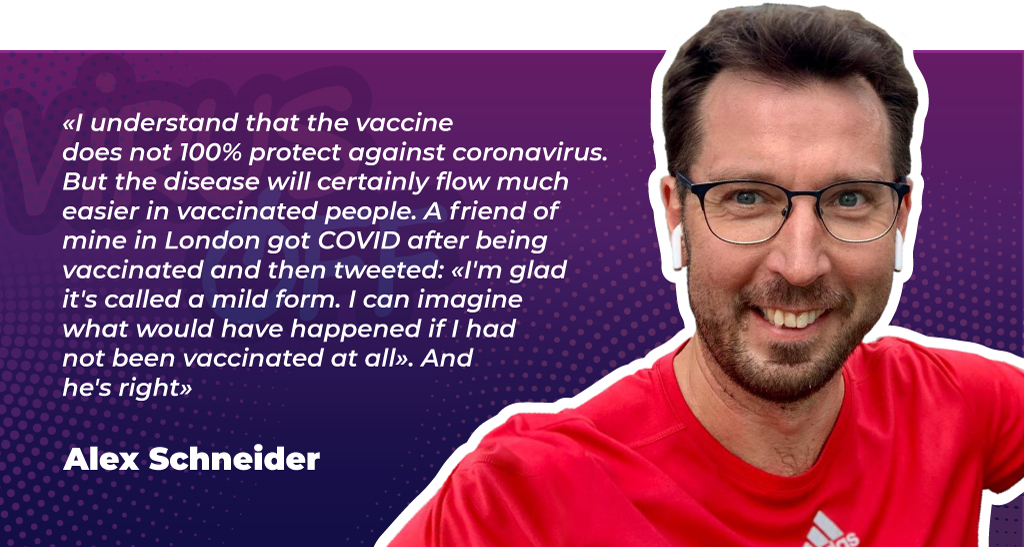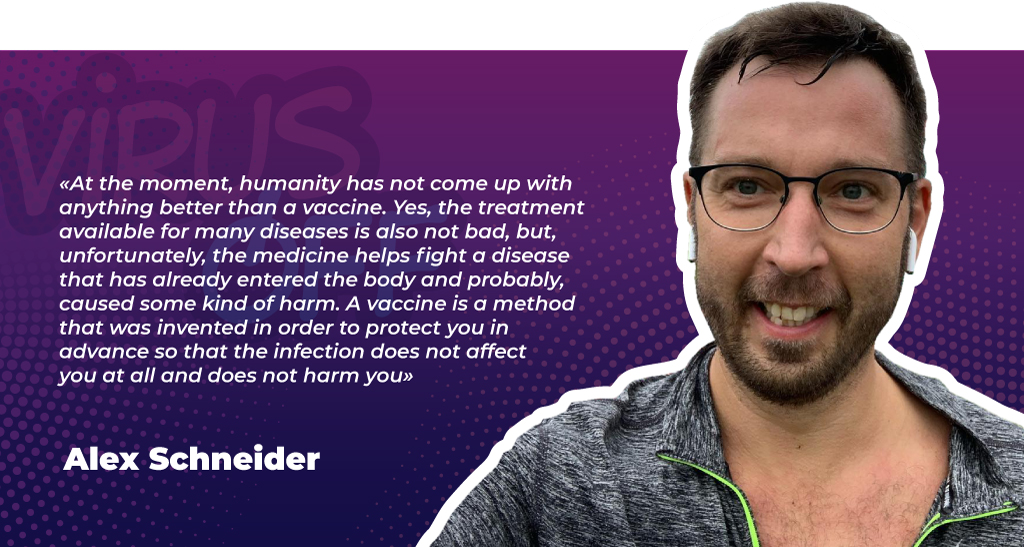Former President of Life4me +, activist and fighter for the rights of HIV-positive people, Alex Schneider, believes in vaccinations and actively promotes them to the masses. It is understandable – a graduated chemist, Alex knows like no one else: the best way to fight a disease is prevention. How many anti-COVID vaccines Alex received and how he has managed to stay away from COVID so far, read in an interview with VirusOff.
Alex, please tell me how many coronavirus vaccinations did you get?
I was vaccinated twice—the first time with two doses of Sputnik, and the second time with the Moderna vaccine.
Why do you need two vaccines?
Because Sputnik is not recognized here in Switzerland, and to go to a restaurant today, for example, we need a certificate of vaccination.
Did you get the Sputnik vaccination in Russia?
Yes.
Did you come on purpose to get vaccinated?
That’s due to a combination of circumstances. It was spring; my husband and I had been thinking about going on vacation for a long time and finally decided to go camping. The only country we could come to from Switzerland was Russia. And we decided to go north, near Murmansk, on a traditional hike with tents. We rest so much, away from people. It was early April, and in Russia then everyone was being vaccinated. In those days, we had a queue in Switzerland. First, they vaccinated those who were over 80, then those who were over 75, and so on. We didn’t know when we would be vaccinated at all. Therefore, we flew to Moscow and went to a private clinic on the second day, where they gave us the first Sputnik vaccination for money. After that, we went on a hike, returned, got the second vaccination, and flew back safely to Switzerland.
Where did you get the Moderna vaccine?
In Switzerland, just a little bit later. Today, you can already be vaccinated anywhere and to anyone. We have tightened the rules, and only vaccinated people are allowed into many public institutions, so people rushed to get vaccinated. The government recently arranged a week of vaccinations, and the vaccine was offered everywhere. Today, the # 1 goal is to increase the vaccination rate in Switzerland to 80%. Now it is between 60% and 70%. There is much more to aspire to.
Is there a difference in attitudes towards the pandemic in Russia and Switzerland?
Of course, it is also apparent. Here, if everyone is told to wear masks, everyone is wearing masks. Even if you are against it, if you have some of your convictions, it’s up to you. However, there are rules, so please follow them. For example, I have not seen someone without a mask on a train or other public transport for a long time. When my husband and I arrived in Russia – well, maybe 20 percent of everyone we saw in public places were wearing masks. Of course, the economic aspect must also be taken into account. When there was a lockdown, most people received some kind of compensation because people could not work, but they had to live on something. In Russia, everything was different; many lost their jobs and businesses. The low mortality rate from coronavirus in Switzerland compared to Russia is also explainable. When you get to a hospital in Switzerland, you do it to get out. And in Russia, people try to stay in bed with their disease at home till the last breath. It does not apply to Moscow, St. Petersburg, and other large cities. Everything is fine there. We are now talking about Russia as a whole.
“Here, if everyone is told to wear masks, everyone is wearing masks. Even if you are against it, even if you have some of your own convictions, it’s up to you, but there are rules, so please, follow them“
Alex Schneider
Do you think you have had the coronavirus, or have you dodged a bullet with it?
I think not, well, perhaps asymptomatic. When I did my first vaccination with Sputnik, I took an antibody test, showing that I was not sick with coronavirus. Then, of course, antibodies appeared, but this is thanks to the vaccination. In fact, it is not so easy to catch COVID; you have to be “lucky.” If you adhere to all these rules (washing your hands often, keeping your distance, and getting vaccinated), you can avoid infection. I try not to forget about these rules, so I don’t worry. Although I understand that the vaccine does not 100% protect against coronavirus. But the disease will certainly flow much easier in vaccinated people. A friend of mine in London got COVID after being vaccinated and then tweeted: “I’m glad it’s called a mild form. I can imagine what would have happened if I had not been vaccinated at all.” And he’s right.
How do you feel about “anti-vaccinators”? Are you trying to convince them?
My own aunt, for example, still thinks that they are experimenting with us. Well, they do it – and they do it, I don’t argue with her. If a person simply doubts the effectiveness of vaccines, I can give them additional information, provide some facts. In the end, I convinced a few friends just like that; they got vaccinated.
Has the pandemic somehow changed your life?
No, not really. It wasn’t very comforting when we were all closed initially, and my husband and I could not calmly go on vacation. For us, after all, a vacation is a trip to the forest so as not to see anyone. And we were forbidden to do that too. But I now have masks in every pocket, and the vaccination certificate is always ready on my phone.

How did your parents survive the lockdown?
They live in Germany, and when we were all closed, we could not go anywhere for about four weeks. And then things got better somehow. When the borders were opened, we really wanted to go somewhere, and we came to our parents. I remember driving on completely empty autobahns in Germany – this is an indescribable feeling. Parents quickly got vaccinated, and today we stay in contact as before. They were looking forward to getting vaccinated and ended up receiving one dose of the American Johnson & Johnson/Janssen vaccine. Parents are careful in this matter, so they made an appointment in advance to get another dose in the winter.
Let’s move from vaccines to your career. Everyone knows that you left the Life4me + organization. Why’d you done it?
Since 2005, I have founded various commercial and non-commercial; I invented them from scratch and brought them to a certain level. I either sold or transferred the work to my partners when the job was done. Life4me + was another project that I came up with and fixed up, and it was time for me to leave. I have a great team, but I need to grow further. So I decided to quit, handing over the reign to Lilya Ten. I am happy that I have Lilya, who substitutes me very well. She will do it, and I’m absolutely sure! For me, Life4me + will forever remain my “child,” whom I gave birth, raised, taught to walk, and gave it to adulthood. For the first time in many years, I got a job for someone, not for myself.
Do you like it?
So far, I’ve only been at a new job for a few weeks, but I love it. I hope it will be so in the future.
What company do you work for?
It is a pharmaceutical company that manufactures HIV drugs. They are completely focused on ARV therapy. Here I am responsible for the implementation of new injection therapy. I am now fully in the commercial business. I am a graduated chemist, so I can say that I have returned to my roots.
You ended your activist career very nicely with a march in London under the motto “Respect my HIV,” was it intended this way?
Sort of. We started planning this March back in April, and then I did not know at all where and when I would go. When I realized that I was leaving for my current position, it was vital for me to finish what the team and I had been preparing for so long before. It turned out very well, we finished the March on Saturday on the last day of the 18th European AIDS Conference, and on Monday, I started my new job.
Looking back, are you satisfied with what you have accomplished so far?
Of course! We fixed up the organization from scratch, and I’m very proud of it. There are many things that we have invented and implemented. The “Undetectable – not transmitting” campaign is used today by organizations throughout our EECA region. And this is good; this is what we were striving for. Even though we were a non-profit organization, we changed the NGO work paradigm. Our people are as accustomed to: write a project, receive money, report to the donor. Everything was different for us, for the first two years, we worked on our own invested money and never depended on grants. We came up with a campaign or a project without thinking about who would give us the money. We had an idea in the first place, and in the future, we always succeeded. If you do a good job, and it is visible, you will be supported. I can say it for sure.

And there should be a final question, and, as you understand, it should be about a vaccine.
Yes, of course!
Why do people need to get vaccinated?
As a biochemist, I will say this – at the moment, humanity has not come up with anything better than a vaccine. Yes, the treatment available for many diseases is also not bad, but, unfortunately, the medicine helps fight a disease that has already entered the body and probably, caused some kind of harm. A vaccine is a method that was invented in order to protect you in advance so that the infection does not affect you at all and does not harm you. Its goal is to prevent disease, in this case, COVID. And I believe that the Nobel Peace Prize should have been given to those who first invented it for the anti-COVID vaccine. However, now it is not exactly clear who was the first. But these people are real heroes.
Text: Elena Derzhanskaya
Photo: personal archive of the hero
A series of materials created supported by UNAIDS




